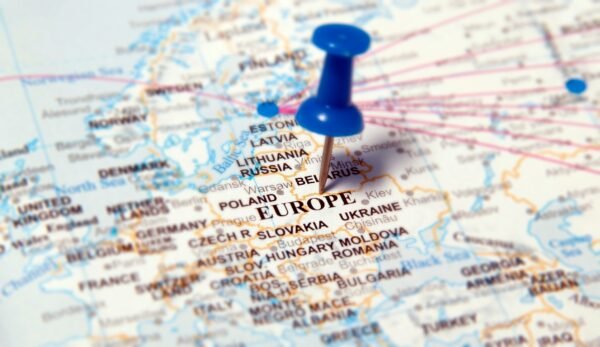
Moving to Europe: 10 Essential Steps and Considerations

Cobblestone lanes, storied cafes, and vistas that steal your breath—the lure of Europe calls! But before packing bags and nabbing a one-way ticket from the U.S., if that is where you are based, take a pause. Relocating to a new continent demands meticulous preparation and a hefty dose of pragmatism.
No need to fret, this post has got your back. Here’s a roadmap to chart your European escapade!

1. Choose Your Dream Destination (But Be Flexible)
Europe is a melting pot of cultures and climates. From Greece’s sun-kissed shores to Amsterdam’s charming waterways, there’s a perfect locale for every soul.
Do your due diligence! Consider factors like living costs, language barriers, and job prospects in your field (especially if you’re a U.S. citizen on a work visa) when searching for the best places to live in Europe. But remain adaptable. Visa options (work, student) and personal scenarios might gently steer you towards a different, equally mesmerizing EU nation.
2. Visa Power: Research and Apply Early
This is crucial. Each European nation has its own visa requirements. Don’t get caught scrambling at the last minute. Research visa types (work, student, even digital nomad visas for remote workers) specific to your chosen EU country.
Then, gather the necessary documents (passports, transcripts, proof of funds) well in advance. Processing times can vary, so apply early to avoid delays. Visa applications can be complex, so consider consulting an immigration lawyer for guidance. In addition, those who have questions about golden visa portugal may consider consulting the experts for professional services.
3. Master the Lingo (At Least a Bit)
While English is spoken in many European countries, fluency in the local language goes a long way. It demonstrates respect for the culture, eases daily interactions, and opens doors to deeper connections with locals.
You may enrol in language classes before you move or utilize online resources like Duolingo. Even basic greetings and essential phrases will make a big difference.
4. Secure Your Nest Egg: Budgeting for Your European Life
Moving to Europe isn’t synonymous with living dirt cheap (though some EU countries offer a lower cost of living than others). Research average living expenses in your chosen location (e.g., rent, groceries, transportation, etc.). Factor in healthcare costs, too.
Many European healthcare systems are excellent, but health insurance might be required. Create a realistic budget that considers your lifestyle and potential savings. Having a financial cushion for unexpected expenses is essential.
5. Find a Place to Call Home: Navigating the Housing Market
Finding an apartment in Europe might differ from your home country. Research rental platforms or enlist the help of a local realtor to navigate the real estate market. Temporary accommodation can bridge the gap while you search for your perfect place. Be prepared for differences like smaller living spaces and higher security deposits compared to what you might be used to in New York City, for example.
6. Pack Smart (But Not Too Much)
Embrace minimalism! Shipping furniture across continents is expensive and time-consuming. Focus on packing essentials and items with sentimental value. Research what appliances are typically included in European rentals (kitchens are often equipped). Consider buying larger items like furniture upon arrival.
7. Banking on Europe: Setting Up Your Finances
Opening a European bank account simplifies your life. Research banks in your new country and their requirements for opening an account.
Also, you may consider transferring a portion of your funds beforehand to ease the transition. Explore options for international money transfers to avoid hefty fees. Don’t forget to inform your US bank about your move to avoid disruptions.
8. Healthcare Abroad: Understanding the System
Healthcare systems vary across Europe. In many countries, you’ll need health insurance. Research your chosen EU country’s healthcare system and how to obtain coverage. If you have pre-existing medical conditions, ensure your insurance covers them. Pack a copy of your medical records for any potential appointments.
9. Embrace the Bureaucracy: Registering and Getting Set Up
Get ready for some paperwork. Upon arrival, register yourself with the local authorities. This is essential for obtaining a residence permit and accessing essential services. You might need to register for utilities, get a local phone number, and open a bank account. Patience is key – navigating bureaucracy can take time.
10. Culture Shock? Embrace the Adventure!
Moving to a new country comes with cultural adjustments. Be prepared for differences in social etiquette, communication styles, and everyday life. Embrace these as opportunities to learn and grow! Be open-minded and patient and don’t be afraid to ask questions. Stepping outside your comfort zone is part of the adventure.
In Closing
Europe awaits! With careful planning and an open mind, you’ll be sipping espresso in a Parisian cafe or strolling along a Spanish beach in no time. So, research your dream city, pack your bags (lightly!), and get ready to experience a life-changing adventure.














































